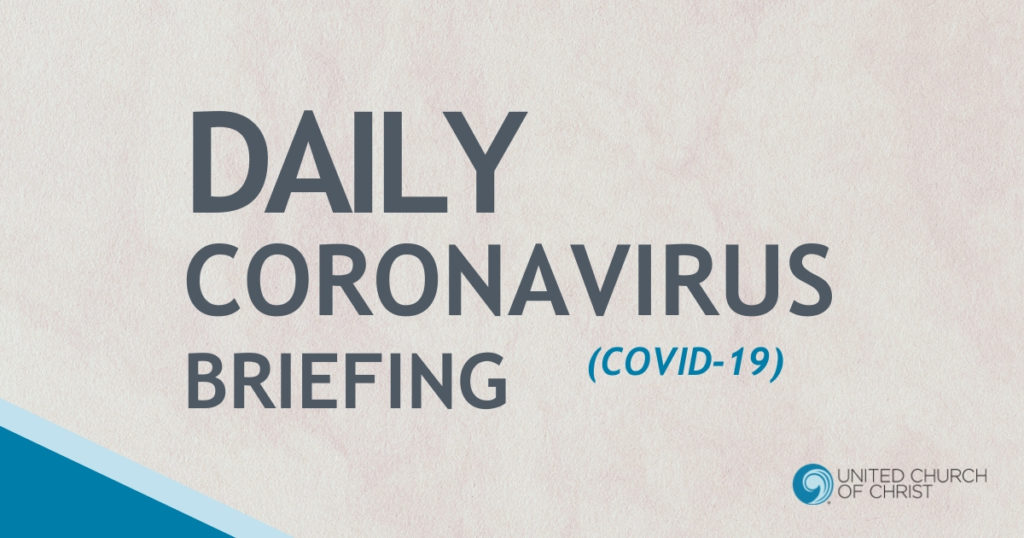Housing injustice laid bare by COVID-19
United Church of Christ – Wider Church Ministries
Humanitarian Development Team
Coronavirus (COVID-19) Daily Briefing
Barbara T. Baylor, MPH – Temporary Health Liaison
Housing Injustice – a Crisis Laid Bare by COVID-19
Editor’s Note: Advocacy opportunity below!
“It’s not that we don’t want to pay our rent – we can’t pay our rent!”
Ponder, if you will, a few comments from tenants who are involved with the Housing Justice for All movement:
“Tenants are having trouble paying their rents and calling for a rent strike on May 1st! Our mantra: ‘It’s not because we don’t want to pay, but because we can’t pay!’”
“Tenants are using 3-4 weeks of income just to pay one month’s rent! We are unable to save anything!”
While this town hall highlighted the rental housing situation in New York City, the U.S. epicenter of the COVID-19 outbreak, rest assured that this issue is coming to you very soon.
According to data from the National Multifamily Housing Council, a trade association for the apartment industry, nearly one-third of 13.4 million U.S. renters (31 percent) didn’t pay their rent between April 1 and 5. It’s the first indicator of how much distress renters and landlords face in the months ahead due to the COVID-19 outbreak.
As a result of COVID-19 business closures since March 14, more than 26 million Americans to date have filed initial jobless claims. That’s roughly one-sixth of the entire U.S. workforce.
The closings have contributed to the difficulty in renters and homeowners making their housing payments – one of the major stressors that families are facing during this pandemic. This has resulted in significant health and financial challenges for both renters, multifamily owners and homeowners.
Understanding the intersection of public health and housing is paramount, especially at this critical junction. Housing and income status are two of the social determinants of health – public health social indicators that may determine physical, social, emotional and mental well-being. They were twin issues even before the COVID-19 pandemic.
An abstract from the American Journal of Public Health cites that poor housing conditions are associated with a wide range of health conditions, including respiratory infections, asthma, lead poisoning, injuries and poor mental health – issues that put one at higher risk for contracting and becoming very ill with COVID-19. Being without an adequate income coupled with the fear of a displacement, eviction and/or foreclosure can have an enormous toll on one’s health.
Many American families are cost- or rent-burdened, which negatively impacts their abilities to pay rent or mortgage. The Department of Housing and Urban Development (HUD) defines cost-burdened families as those “who pay more than 35 percent of their income for housing” and “may have difficulty affording necessities such as food, clothing, transportation, and medical care.” Severe rent burden is defined as paying more than 50 percent of one’s income on rent.
An estimated 12 million renter and homeowner households now pay more than 50 percent of their annual incomes for housing. COVID-19 has exacerbated this housing instability crisis.
Further, housing instability also falls more heavily on people of color. According to a study by the Joint Center for Housing Studies (JCHS) at Harvard University, nearly 55 percent of Black renter households were cost-burdened, followed by Hispanic households at 53.5 percent, and Asian households at 45.7 percent, compared to 42.6 percent for white households. Racial health disparities have been studied for more than half a century and remain stable. Some researchers have speculated that persistent residential segregation is one of the common threads that links many of these disparities together.
Late in March, Congress passed the Coronavirus Aid, Relief, and Economic Security (CARES) Act, a $2.2 trillion package of relief measures for businesses, state and local governments, and individuals. Included in the package was a 60-day moratorium on foreclosures on homes with federally backed mortgage loans.
The law also allows multifamily property owners with federally backed mortgages to request a “forbearance” – a delay of mortgage payments with no accrual of interest or fees. Landlords who receive forbearance under the CARES Act would be barred from serving eviction notices to tenants during the period of forbearance.
The law also prohibits all landlords with federally backed mortgages from evicting renters until at least July 25. Even if you’re temporarily protected from eviction, you’re still legally supposed to pay your rent. If you don’t, under the current rules, your landlord could try to evict you as soon as the emergency is over.
Unfortunately, the latest stimulus package passed last week still doesn’t go far enough to protect families from eviction. So the movement to cancel rent during the COVID-19 pandemic is going national.
On Friday, Rep. Ilhan Omar (D–Minn.) introduced the Rent and Mortgage Cancellation Act. Rep. Ocasio-Cortez and Housing Justice for All are asking that you call your legislative representative and ask them to please support this proposed bill. Additionally, research laws and policies in your own state regarding rent and mortgage moratoriums. Start a local movement to cancel rents and mortgages.
Resource:
HUD’s newest guide gives homebuyers in search of affordable housing several options and resources: Affordable Housing Resources for Renters
References:
Cancel the Rent: A Conversation with Housing Justice for All
American Families Face a Growing Rent Burden
Coronavirus: Nearly a third of tenants fail to pay April rent on time
Rental Burdens: Rethinking Affordability Measures
The Severe Health Consequences of Housing Instability
Housing and Health: Time Again for Public Health Action
What to Know About Housing and Rent During the COVID-19 Emergency
Related News
Planning for Earth Month: Resources for Congregations
April is Earth Month, and for congregations, it can be a great time to further discern how...
Read MoreBodily Autonomy Means Every-BODY
Advocacy and Action for Women's and Gender Justice Local events stir thoughts and...
Read MoreAn ally experiences PRIDE in the CLE
Advocacy and Action for Women's and Gender Justice Local events stir thoughts and...
Read More


